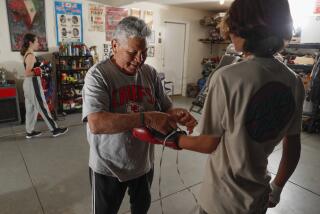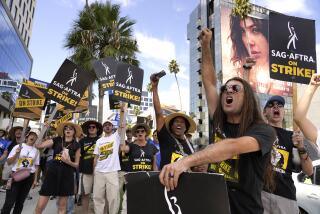Bill may benefit Filipino veterans
- Share via
WASHINGTON — After a decades-long struggle, Filipino veterans of World War II finally may be granted U.S. military benefits thanks to, of all things, the economic stimulus legislation.
A $198-million provision of the proposed Senate stimulus bill would authorize one-time payments of $15,000 to Filipino veterans who are U.S. citizens -- many of whom live in California -- and $9,000 for noncitizens, including those in the Philippines.
The provision is a small part of the overall $885-billion bill, but it has drawn criticism. North Carolina Sen. Richard M. Burr, top Republican on the Senate Veterans’ Affairs Committee, “finds it difficult to see how spending money in the Philippines will help stimulate the American economy,” a spokesman said.
The veterans, many of whom are in their 80s and 90s, have fought hard for the benefits: In 1997 in Los Angeles’ MacArthur Park -- named after Gen. Douglas MacArthur -- a group of protesters chained themselves to a statue of their former commander.
“We think this [stimulus bill] is the best chance for us to get this benefit approved,” said Franco Arcebal of Los Angeles, a vice president of the American Coalition for Filipino Veterans. “We’re only about 15,000 left now. I’m 85, one of the youngest.”
The payments were added to the legislation by Sen. Daniel K. Inouye (D-Hawaii), chairman of the appropriations committee and one of three remaining World War II veterans in the Senate.
“It’s a matter of honor and the good name of the United States,” Inouye said outside the Senate chamber Tuesday. He noted that in 1941, President Franklin D. Roosevelt promised the benefits, but Congress reneged on the pledge in 1946.
As for whether the veterans’ payments belonged in the stimulus package, Inouye said, “I’m looking for any vehicle that will carry this forward.”
Congress last year approved appropriation of the Filipino veterans’ benefits, but authorization is needed before the money can be paid.
There is no provision for the veterans in the House bill. If the item survives in the Senate, it will be the subject of negotiations to reconcile differences in the two chambers’ bills.
The veterans’ measure is among a spate of bills aimed at rewarding the sacrifices of World War II veterans -- who are dying at a rate of about 850 a day -- and healing wounds lingering from the war era.
Other bills include the Belated Thank You to the Merchant Mariners of World War II Act to provide payments to members of the merchant marine, sponsored by Rep. Bob Filner (D-Chula Vista), and a measure sponsored by Rep. Xavier Becerra (D-Los Angeles) to create a commission to investigate the government’s actions in the World War II internment and deportation of Latin Americans of Japanese descent.
Among the critics of including benefits for the Filipino veterans in the stimulus package is Rep. Steve Buyer of Indiana, the top Republican on the House Veterans’ Affairs Committee.
“I do not question the valor and courage of the Philippine army, which fought alongside U.S. forces to defeat Japan in World War II, and I am not opposed to discussing ways to compensate these veterans. However, to do so and say it under the guise of stimulating the American economy is a complete falsehood and is the lowest form of partisan politics.”
Arcebal called the payments a “small token to recognize our service.”
Even if the benefits do not make it into the stimulus bill, this could be the year that the veterans achieve victory.
Several of their longtime champions are now in key positions in Congress: Filner and Sen. Daniel K. Akaka (D-Hawaii) chair the House and Senate veterans affairs committees, respectively, in addition to Inouye chairing the appropriations committee.
And President Obama, during the presidential campaign, expressed support for granting benefits to the Filipino veterans.
“If the Senate decides that this isn’t the appropriate time or place, we’re optimistic that we’ll find the right vehicle in the future,” said Rep. Michael M. Honda (D-San Jose), chairman of the Congressional Asian Pacific American Caucus.
--
More to Read
Sign up for Essential California
The most important California stories and recommendations in your inbox every morning.
You may occasionally receive promotional content from the Los Angeles Times.











